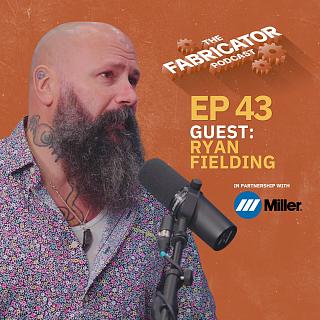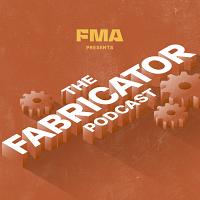A Rolls-Royce and other SEMA builds with Ryan Fielding of Ringbrothers
Ryan Fielding of Ringbrothers joins hosts Dan Davis and Josh Welton on this episode of The Fabricator Podcast, in partnership with Miller Electric at SEMA 2023 in Las Vegas. Ryan goes into detail about the three builds that Wisconsin-based Ringbrothers displayed at SEMA: a 1965 Ford Mustang Convertible called “Uncaged”, a 1961 Rolls-Royce Silver Cloud II called “Paramount”, and a 1969 Dodge Charger called “Tusk”.
Ryan also talks about how his family's background influenced his career as a fabricator, how he learned to weld when he was 8 years old, and his grandfather's stint as a stunt car performer with Jimmie Lynch and The Death Dodgers. He also talks about starting his own hotrod/motorcycle fabrication business, Paragon Customs, and how he was subsequently convinced to join Ringbrothers.
He also discusses Ringbrothers winning the SEMA's 2022 Battle of Builders with its 1948 Chevy Loadmaster, his love of pinstriping, and creating goalie mask artwork for the Wisconsin Badgers men's ice hockey team.
Email us at podcast@fmamfg.org with any comments, questions, or suggestions.
In This Episode
Learn more about Miller Electric.
Learn more about Millermatic 142.
Learn more about podcast sponsorship opportunities.
ABOUT THE FABRICATOR PODCAST
The Fabricator Podcast brings you conversations with people in manufacturing who make things out of metal. We speak with manufacturers, metal fabricators, welders, job shop owners, small business entrepreneurs, artists, marketers, educators, and more. Host Dan Davis also goes beyond discussing just manufacturing and the skilled trades, and chats about pop culture, current events, food, music, movies, comedy, and, of course, robots. The Fabricator Podcast is presented by the Fabricators and Manufacturers Association.
We shape the conversation around metal.
Host: Dan Davis
Producer/Editor: Gareth Sleger
Video Producer/Editor: Brandon Geier
Ad writer/spokesperson/social media: Sara Spring
Additional video editing: Dana Wiker
Graphics: Billy Kulpa
Marketing support: Elizabeth Gavin, Mary Diamond
Sales support: Andy Flando, Amy Hudson
Web support: Mike Owens, Jared Carlow
Additional support: Ed Youdell, Maurine Semevolos, Lincoln Brunner, Tim Heston, Rafael Guerrero, Josh Welton, Darla Welton, Amanda Carlson-Hicks, Callie Check, Rick Lehnhardt, Judy Steinbach.
Where to listen to The Fabricator Podcast:
Follow The Fabricator:
- YouTube
TRANSCRIPT
Ryan Fielding: I was about eight when I started welding. Living in the country. And we're a blue collar family right? My dad didn't see the point and go into the Honda dealer and spend $4,500 on a four wheeler. When he could go buy a 76 Chevy pickup truck for 50 bucks from the guy out on the highway. Like that's his go cart now.
Sara Spring: This episode of The Fabricator Podcast is brought to you by Miller Electric. Welders make their impact one welder at a time, leaving a piece of themselves in every finished project. Miller supports and fuels their passions with machines, technology and safety equipment to meet the ever evolving needs of manufacturers, fabricators, construction workers and artists. Because it's not just about welding. It's about fostering new ideas and inspiring the next generation. Go to millerwelds.com to learn more.
Dan Davis: Hello, this is Dan Davis, The Fabricator Magazine joined by Josh Weldon of Brown Dog Welding. We're here at the SEMA Show, thanks to Miller Electric, our partners in this event and we thank them for providing us some space to do this at the SEMA Show. This episode will be talking to Ryan Fielding of Ring Brothers.
Josh Welton: Super interesting guy.
Dan Davis: Yeah, they do some introduction, I shouldn't say not introductions, but make some cars for this event every year and this year is no different. Some pretty cool stuff, one of which is a 69 Dodge Charger and I know that's right up your alley.
Josh Welton: Yeah, it is.
Dan Davis: Is there like a car that may be out there you haven't driven you'd love to drive?
Josh Welton: I mean, I wouldn't mind getting a taste of some supercars just to get a feel for for how they... I mean, just lightweight, big engine, different exotic motors types but-
Dan Davis: Driving on a straightaway or like a circuit course?
Josh Welton: Anything. I like driving on the street. Like you can't get too crazy, but you can get kind of crazy.
Dan Davis: Yeah, and you've done a little bit of that with some of the stuff-
Josh Welton: Yeah, yeah, like road tripping stuff. I'm not a big into racing. I like going fast but I'm not necessarily in the competitive kind of thing. A car that I have driven that would be up there is my friend Ralph [inaudible 00:02:28] has a 68 charger, full carbon fiber body, speedcore built it, [inaudible 00:02:34] how often engine, 1000, 1300 horsepower, whatever happens to be when they tune it certain ways. But we took that, Ralph and I took it on part of the Hot Rod Power Tour. So I drove 11, 1200 miles of it. And that car is so slick. Just you were talking about, Brian ends up talking about 3D printing parts for the cars. And like all the knobs were 3D printed aluminum or not aluminum but like titanium.
Dan Davis: Oh, wow.
Josh Welton: Yeah, just everything that they did for the sound system. It's on a tray that's like super secure, so it doesn't rattle at all. And then you can pull it out and you can access all your electronics in the trunk. So like, it does everything well. And plus it's full carbon fiber, which you just don't see people driving those on the road. I like driving things on the road that other people wouldn't or like doing things that other people wouldn't like driving the ACR Viper out here for SEMA a few years back, like that was dumb. But it was awesome. Nobody else is stupid enough do that. But I did it because...
Dan Davis: Does it saddened you that some of the big three are car makers in general aren't doing some of those, not one offs, but you know, aspiration type projects like they use too.
Josh Welton: They still do. So like, if you visit like in Detroit, or around Detroit, Chrysler has a museum with packed full of old concept cars or like even recent ones, like they build Jeeps for Moab. So basically, they're company builds, and then they hold on to them for marketing or whatever else. But they still do those, they're more functional because back in the day you couldn't make crazy stuff functional in that amount of time. And also, it was a thing to see how people would react to it. And there was so much time and consumed in that Whereas now because of technology and building on their own platforms that they already had... Like back in the day, they actually used to build certain kinds of cars on a neon platform, because that chassis was just easy to move cars around with. Now everything's functional, and they could get more bang for their buck doing something and people look at it and are like, "Oh, that's real," then that adds a ton of value.
Dan Davis: Walking around seeing what you see other people kind of-
Josh Welton: Oh, yeah, totally inspiring.
Dan Davis: Yeah. Whereas it-
Josh Welton: Good and bad.
Dan Davis: Yeah. That's true.
Josh Welton: There's a lot of bad. I think there's a lot of everything.
Dan Davis: Yeah, yeah. I think sometimes, change is not always good.
Josh Welton: Not always. And some people they're like wanting to do something unique, but just because it's unique doesn't mean it looks good.
Dan Davis: Right, right.
Josh Welton: Or functions well.
Dan Davis: But that's kind of fun though.
Josh Welton: It is fun. And it's cool to see... It's even cool to see builders grow the show because I've been going here for over a decade and seeing someone who'd like just had a truck outside now they got a booth inside or whatever. And the level of workmanship and the vehicles I think they were getting called because everything here is exposed and everyone's got a camera, everyone's dissecting everything. And I think enough people got embarrassed by having really shoddy welds on a six figure car they try not to do that as much anymore.
Dan Davis: Right. And you have people with some real expertise walking this, on the show.
Josh Welton: Yes. Yeah, you got you got some of the best fabricators in the world rocking here. Obviously Fab Tech which is more niche. That's like we call it fabricators Super Bowl. Yeah, here is just like a whole... it's hard to explain because it's a car show that's not a car show. It's a trade show that's not a trade show.
Dan Davis: Fabricating expert, car nerds, engineers, you got all kinds of people.
Josh Welton: Yeah, everything, everyone. The big three is usually while we're represented here, they... Ford pulled out and then Chrysler pulled out this year. Ford pulled out last year. I think because of the growth of the show, everything has become so expensive that the radon return changes.
Dan Davis: Yeah, yeah, yeah.
Josh Welton: The return on investment changes. But yeah, it is inspirational to see... Like on the way and we just got stopped by a couple of over-landing vehicles that were like, "Oh, that's a cool idea. We can do that."
Dan Davis: Yeah.
Josh Welton: So yeah, it's a lot of fun like that and it's making connections.
Dan Davis: Oh, yeah. And I think you'll find or at least hear some of that inspiration coming from Ryan as we talk with him.
Josh Welton: A 100%.
Dan Davis: Three cars that not only the charger but a Ford Mustang in a Rolls Royce of all thing.
Josh Welton: The Rolls Royce is so sick.
Dan Davis: Which is, from a standpoint, you see Rolls Royce, you appreciate it's a luxury.
Josh Welton: A luxury, it is.
Dan Davis: But there's a lot of story... We're chatting about the performance of the car, so it's-
Josh Welton: Well they changed a lot about the [inaudible 00:07:02] of the car.
Dan Davis: Oh, yeah, and actually took it drag racing.
Josh Welton: And be one of the brand new Rolls Royce's which are not slouches either. So at the airport, I've always wanted to race on an airport drag strip
Dan Davis: I've always wanted to chase after a European terrorist taking off in a jet, in an airport.
Josh Welton: Yeah, and then running your car into their landing gear-
Dan Davis: Exactly.
Josh Welton: ... and then they crash and burn and you're the hero. I get it.
Dan Davis: Yes. Unfortunately, my four banger in present won't go that fast. So anyway, enjoy this episode of The Fabricator Podcast. Thanks to Miller Electric again, our partner in this event and enjoy.
Sara Spring: Every job deserves Miller quality. That's why the new Millermatic 142 makes professional quality MIG welds easy. Miller's newest portable MIG welder is fast and simple to set up, has a high duty cycle and can run on generator power. Everything you expect from a Miller MIG welder. Give every job you weld no matter its size, pro quality results with the Millermatic 142. Learn more at millerwelds.com. Now's a good time to mention that we offer sponsorship opportunities for the podcast. Amy Hudson, Senior Account Executive is here to give us a quick overview.
Amy Hudson: Yes, we have two sponsorship levels. The first has logo placement, some ad regions. The second option that we're really excited about is definitely kind of cool where you can bring in a customer and kind of tell the problem solution story that way.
Sara Spring: Great. So to get all the details, please go to the fabricator.com/advertise or you can contact your sales rep directly. And now back to the episode.
Dan Davis: We're at the SEMA show in Vegas, special guests of our partners Miller Electric. We thank them for having us in their booth. And Ryan, thanks for joining us
Ryan Fielding: You bet. Glad to be here
Dan Davis: Is a big deal for y'all. Right?
Ryan Fielding: It's always a big deal for us. Yes
Dan Davis: Yeah.
Ryan Fielding: I mean, SEMA is where it's at, every year we look forward to unveiling the cars that we try to keep under wraps all year and we finally get to share the pictures, share the stories and it's really exciting. It's always down to the last minute and this year was no exception.
Josh Welton: 100% every year.
Ryan Fielding: No exception. We had two totally ready and the charger that's in our booth over there. We had the dually run and the trailer door open, garage door open, gym in the driver's seat and me and a couple of the guys were putting the last of the interior panels in and it went into the trailer and headed west.
Dan Davis: That's awesome. So now how long have you been doing cars and unveiling them over here at SEMA?
Ryan Fielding: Gee, it's got to be for for Mike and Jim. I mean, they gotta be over 15 years of coming to SEMA.
Dan Davis: Yeah. And how long have you been with the Ring Brothers?
Ryan Fielding: So I've been with Ring Brothers three years. I had my own shop for just under 20 years before the Mike called me up and convinced me to hang a close sign on my own shop and come build cars with him.
Dan Davis: Yeah
Josh Welton: That's awesome.
Dan Davis: Yeah, that's coming neat. Kind of doing your own thing and kind of joining up with some other folks.
Ryan Fielding: Absolutely. We had talked about it for years, right? So we were only half an hour apart, we actually went to the same high school.
Dan Davis: No kidding.
Ryan Fielding: They were ahead of me by a number of years, but we knew each other and I'd always stop in and see what what they're up to. And we'd run into each other during hunting season and such and always talk about what both of us are up to and kind of always kicked around the idea of getting together sometime on something. And the opportunity presented itself here a few years ago, and like you said, I hung that closed sign. Put my shop into a couple of semi trailers and brought it down to down to Ring Brothers.
Dan Davis: [inaudible 00:10:40]
Ryan Fielding: So it's been excellent.
Josh Welton: Very cool. I need one of those shirts.
Ryan Fielding: We can make it happen.
Josh Welton: I love that shirt
Dan Davis: That's awesome. So cars this year, can you talk about some of them ones a little bit please?
Ryan Fielding: Absolutely. So we brought a Rolls Royce 61 Silvercloud, 65 Mustang convertible, and 60... I'm sorry, a 65 Mustang convertible, and a 69 Dodge Charger. The Roll's definitely a departure for us. We'd never done a Rolls, really hadn't done anything.
Dan Davis: Really didn't mess too much with the body, right?
Ryan Fielding: We really didn't. Yeah.
Josh Welton: That's my favorite thing about... Sorry to interrupt.
Ryan Fielding: No, you're good.
Josh Welton: What you guys do is there's not like a single focus vehicle. Like you're all over the border with brands, with types, with styles.
Ryan Fielding: Absolutely.
Josh Welton: That's awesome. Yeah. From Winnebagos to Rolls Royces.
Ryan Fielding: Absolutely. Yeah. You know that it keeps it exciting in the fab shop, right.
Josh Welton: 100%.
Ryan Fielding: And so we always have something totally different going in. And then we have like the Mustang, obviously, we're kind of known for Mustangs, we've done a lot of them. So that's always great. Because we can try new things, right? Every car you do, after you're done, you look at it and you love it, it's great. But like maybe we should have this or maybe we should have that or... And you can take all those things, and then when you inevitably do the next one, you can put those ideas into it right? And everything you do, each one should get better than the last right? That's always the idea, right? If you start going the other direction, that's a problem. So trying to stay innovative, come up with new products, and come up with new ideas on how to go about the builds that we do is fun. But yeah, with that Rolls Royce, we hadn't done anything like that we didn't really do any body mods. We just, I mean Rolls Royce builds a hell of a car as it is. So we didn't have to do much styling wise.
Ryan Fielding: And not for nothing we didn't want to take away any of the Rolls Royce styling that it has, but we cleaned up everything we could and just refined some of those lines. But where we really changed the game on a Rolls Royce is everything you don't see. Chassis,[inaudible 00:12:42] drive train, interior, that sort of thing and suspension, just although all of those components just it makes it a hell of a car.
Dan Davis: It's kind of a neat to have like an American handprint on something-
Josh Welton: Absolutely.
Dan Davis: ... extremely European English.
Ryan Fielding: Yeah.
Josh Welton: I used to the drag race video last night. It's super cool.
Ryan Fielding: Oh, that was a lot of fun. So we drag races, the two Rolls Royces. And it was funny. So the idea was, of course ours needed to win, right? There wasn't a choice. We're like, okay, maybe we need to back off on the new one a little bit. And you know what? But there was no backing off. They're both hammered down.
Josh Welton: Really, that's awesome
Ryan Fielding: And the new one couldn't catch ours. So that was pretty great.
Josh Welton: Yeah, that's awesome.[inaudible 00:13:27]
Dan Davis: It's got to be so weird to hop in a vehicle like that and be like, "Oh, this does this."
Ryan Fielding: Yeah. It's wild. You get in like cars 21 feet long or there abouts. And it's refined and elegant and classy. And it's relatively quiet, right?
Dan Davis: Yeah.
Ryan Fielding: But it's got cutouts. You step on it and that LT4 lights up. And you hear that supercharger whistle, those exhaust cutouts open up. And that's the rocketship.
Dan Davis: That's funny.
Ryan Fielding: It really is. And it's got table manners. I mean, it handles beautifully, [inaudible 00:13:55] shop chassis and suspension. On the wheel and tire setup that's on there, they're not enormous but there are definitely a much larger footprint than what it looks [inaudible 00:14:07]
Josh Welton: But it look like it should look. It looks perfect.
Dan Davis: Yeah, right.
Ryan Fielding: That car won't looked right if we tagged it and put on the giant tires in the back. But I mean there's a good footprint there and that goes to the handling. And I mean I think that thing will turn will corner and you don't get a lot of body rockets. It's really interesting and a car that big you expect it to have a big swell when you turn and you really don't. So it's fun car to drive.
Josh Welton: That's cool.
Dan Davis: It's fun.
Ryan Fielding: Yeah. And the owner is great and he's just so excited to to get it and get driving. And he was there when we shot that video and he was just all smiles. He thought that was really neat.
Josh Welton: Here's a payoff right there. That's incredible
Ryan Fielding: Absolutely.
Dan Davis: [inaudible 00:14:48]Immortalized. So the Mustang itself, it's funny, we were just talking about like luxury. I see that car and it makes me think of like, a cool 70s like then and a whole[inaudible 00:14:58]-
Ryan Fielding: Yeah.
Dan Davis: Little leather furniture-
Ryan Fielding: Like the drop in our living room.
Dan Davis: Yeah, exactly. It's a moment in time al[inaudible 00:15:04] y'all created there.
Ryan Fielding: Yeah, absolutely.
Dan Davis: That was pretty cool.
Ryan Fielding: Yeah. So Steve from Upholstery Unlimited did did the interior in that car. And you know that tan or camel color against that red? It's one of my favorite color combinations to be honest. I think it just looks good and everything-
Dan Davis: Yeah, I agree.
Ryan Fielding: But specifically what he did... And we had I don't know if you notice, but so like those door panels, those are 3D printed, that console is 3D printed-
Dan Davis: Oh wow
Ryan Fielding: And then he wrapped them in leather, and [inaudible 00:15:29]Eric coded some components.
Dan Davis: That's crazy.
Ryan Fielding: So that was something we hadn't really explored too much. So we're normally we might build those panels in aluminum or something, those particular ones on the Mustang were 3D printed.
Dan Davis: Wow.
Ryan Fielding: And then we built the structure surrounding them all with aluminum or sheet metal. But the printed components were then wrapped in leather by Steve. And of course then he did that the seats and belt the bolsters. I mean, you you get in that car, and it's like sitting on the couch.
Dan Davis: Right, right.
Ryan Fielding: It's great.
Josh Welton: Nice.
Dan Davis: That's awesome. I'm goiNg to a let Mr Mopar ask about the Dodge.
Josh Welton: So I was actually trying to watch a video of it last night, and the YouTube kept freezing up. So you told me about your dad.
Ryan Fielding: About the Dodge, yeah the Charger. So the car's name is-
Josh Welton: 69?
Ryan Fielding: 69 Charger, yup. Named Tusk. It's got an elephant in it.
Josh Welton: Nice.
Ryan Fielding: T566 speed.
Josh Welton: Yeah.
Ryan Fielding: So, like most of our builds, we don't want to change so much that it doesn't look like what it is. Right? And that was important with this car. But we wanted to change enough things to make it a Ring Brothers car, right?
Josh Welton: I understand. There's that balance. I do the same thing with my art is like people are like, "Oh, that's so detailed. It's like not really, it's your eyes telling you." So you pick out those few things that make a car, a car or a truck, a truck. And then you can't... Those are the immutable things.
Ryan Fielding: Absolutely. And you know what's really cool. So we had a number of people in the booth looking at the car and talking to them. And they there was two guys specifically that had 69 Chargers. So it's really cool to talk to guys like that when they're looking at the car and say, start picking out those things that we changed by a quarter inch. That we change by an inch. The fact that we welded this piece of trim together were normally would have a separation. And most people look past that, right? Because what you're going for is not necessarily... I mean obviously, there's some things that immediately draw your attention. But you don't want that to be everywhere where you're-
Josh Welton: You're too busy, you can't have it too busy.
Ryan Fielding: So you want some of those things that you don't notice it because it's so right.
Josh Welton: Yep.
Ryan Fielding: And that's what we always shoot for. So that charger, two of the big things we did, and there's there's a lot of them. But the ones that really stick out, right. So on the side, the 69 on the door had kind of two indentations that mimicked like a scoop or... They're in the front of the door there.
Josh Welton: This scallop scan[inaudible 00:17:48].
Ryan Fielding: Yeah, so we got rid of those, made a whole new door skin and just continued those body lines all the way to the front of the door. And then in the fender, we made new fender sides. So from that top body line down, we made that new and we put functional scoops that same shape and size that were in the door, but they're actually 3D. Or I'm sorry, CNC machined billet aluminum scoops that are functional, they draw air from the wheel [inaudible 00:18:15] and come out right there.
Dan Davis: Nice. I'm looking forward to go check it out right after this.
Ryan Fielding: And super cool. And we sent those into the fender. We moved the engine back three inches from where it was set up to being[inaudible 00:18:23] we moved the wheelbase forward two inches. So the handling, we really haven't a chance to drive that car. Like I said, we got together right before we came here.
Josh Welton: It's a heavy fricking engine.
Ryan Fielding: Yeah, but having it back like that, I think it's going to handle really great. I'm excited to to get some miles on it
Dan Davis: [inaudible 00:18:39] to somebody who's actually used a handling a 69.
Ryan Fielding: Yeah
Dan Davis: And now how it compares.
Ryan Fielding: To see how it compares. Absolutely.
Josh Welton: That's [inaudible 00:18:46].
Ryan Fielding: Then in the hood, so carbon fiber hood. There's really not all that many carbon fiber components on that car. But we've got a carbon fiber hood, carbon fiber grill. But the hood, we had to get around the elephant of course, right. It's a tall molder with that supercharger up on top. We got it down as far as we could but we still needed room for everything that goes with that supercharger. And we've got two big CNC machine scoops that mimic what's in the fender, but they're sitting like this in the hood.
Dan Davis: Oh, wow.
Ryan Fielding: So it's kind of a cowl that turns into these two aluminum scoops and they're good sized.
Dan Davis: Oh cool.
Ryan Fielding: And then in the front, Mike and myself and Shawn in the fab shop, we were looking at it one night. And if you know 69 Chargers, they have that grille surround is plastic, and they all kind of dip out because they had only a few fastening points on the top, and that section would tighten up and in between them they would dip. And there's really nothing you can do about it. The rip offs are even worse. So we're like, the only way around is to do in carbon. So we decided that night that we were going to do in carbon, we scanned it, and it made a grill surrounding carbon. Once we had that then we decided that the grill trim which was-
Josh Welton: Did [inaudible 00:19:58]seven carbon?
Ryan Fielding: No that was laid by Gemini.
Dan Davis: Okay, cool. Cool.
Ryan Fielding: Yep. So it made a mold and laid it. Then there's trim, chrome trim that went around that grille surround and that was originally seven pieces. So you had like your ends, and then two flats here and here and then at centerpiece, and that was like snapped stainless or stamped aluminum. And the way they lay over just, you can't make them look good.
Dan Davis: Right, right.
Ryan Fielding: Even if you weld it together, at the end of the day it's stamped thin metal. So we decided to machine that.
Dan Davis: You're going out on a bill.
Josh Welton: Yeah, you got to find those little things like that.
Ryan Fielding: Yeah, that one was a challenge for the guys in the machine shop. So we started with between the fixture and the part itself, 538 there about pounds of billet whittled down to 2.3 pounds for that one piece, grille surround trim that we then had AAH Chrome down at the [inaudible 00:20:46] did the chrome plating on it. And they did all the chrome on the car and did an excellent job like they always do. But that was quite the piece.
Dan Davis: Yeah. It sounds like it.
Ryan Fielding: Because it's so thick, right? It's like this, but it's this long-
Josh Welton: It's so crazy sometimes it's the littlest detail that costs so much time and money to get it right.
Ryan Fielding: Oh yeah. Yeah. Between design and then just figuring it out, and the materials and the runtime and machining.
Josh Welton: Powering and machining.
Ryan Fielding: Yeah. Yeah.
Dan Davis: If you go back in the day just to mass produce stuff like that.
Ryan Fielding: Yeah. Yeah.
Josh Welton: With tape measures and stuff, not even funny. Pencils and-
Dan Davis: Yeah.
Josh Welton: I love seeing those old guys... See the drafting rooms that the big three back in the day. And it's just like a bunch of guys smoking pipes with these tubes, dragging boards. Yeah, drawing things out to scale.
Ryan Fielding: Yeah, and it's wild. It's wild. And it's obviously the technology that is at our fingertips. Now 3D printing-
Josh Welton: ... is incredible.
Ryan Fielding: Just for prototyping, right. We utilize that so often where we'll be able to look at something say the exhaust gets on that car on the charger. So we're looking at it, decided on kind of what we wanted the shape to be, drew up just a piece of cardboard and kind of drew it out of like, "Yeah, about this big and about this shape." Took it to the guys over in the machining building, they modeled it in SolidWorks. 3D printed it. Like the next day I had a 3D printed exhaust tip that we did in three pieces, one piece welds to the exhaust, the center section bolts to that, and then the outer section you can... In the future, we can make whatever we want. Like that can be different. Yeah. So we can use it in the future. But anyway, within a couple of days of having the idea here's two 3D printed ones that you can bolt into the car and go out, "Yeah. Let's make it a little smaller..."
Josh Welton: We live in a wild time.
Ryan Fielding: Yeah. versus you'd have to make it all the way through previously, and it's-
Josh Welton: And you have to change it here, change it there, redo a bunch of stuff.
Ryan Fielding: [inaudible 00:22:32]
Dan Davis: Do you feel tempted to try to do more like intricate, more detailed type changes to cars.
Josh Welton: Yeah, have access to all this technology?
Ryan Fielding: Absolutely. That's, like I'm say those scoops where, the way that they sit we try to... Nothing we do is is flat or necessarily has right angles, everything can be smooth and rounded and have just a slight curve to it so like those scoops, you don't see it at first glance but if they if they weren't slightly arched, you'd know it because they'd look too flat against that rounded fender, right? When you're modeling it, and they can they can just make that arch just go up by 30,000.
Josh Welton: They dial it in.
Ryan Fielding: Yeah, yeah. So you can really dial it in. And then toolpaths, like on those we left the toolpaths and parts of it, and painted through them. So you can see that it was it was done that way. And those guys can can make that toolpath whatever they want.
Josh Welton: Oh wow.
Dan Davis: Oh wow.
Ryan Fielding: Have them go with the lines of the car. And that's kind of what we did on that one.
Josh Welton: That's dope.
Dan Davis: That's awesome.
Ryan Fielding: Yeah.
Dan Davis: That's awesome.
Ryan Fielding: That's really great. It's just wonderful to have that access to that kind of technology.
Josh Welton: No, right on it
Dan Davis: So you'd like you're a third generation like, fabricator.
Ryan Fielding: Yeah.
Dan Davis: Correct?
Ryan Fielding: Yeah. Yes, sir.
Dan Davis: Did your family kind of influenced what you wanted to do with your life?
Ryan Fielding: A 100%. So it all started with my my grandfather. He was a professional stuntman, motorcycle rider, racer, and did circle track stuff. But he traveled with, as Jimmy mentioned, the Death Dodgers. They were-
Dan Davis: That's awesome.
Ryan Fielding: Yeah, they were a traveling Stunt Show. And they did like state fairs and county fairs and that sort of thing. Mostly around the Midwest, Kansas, Nebraska, Iowa, Wisconsin, that sort of thing. And yeah, they would do all all this crazy stunt work, jumping over cars and that sort of thing. And then he met my grandma and she said that's enough of that. No more. So then he had to... He had a welding shop, it started he buy wrecked cars. And then picks them up and put them out try to sell them.
Dan Davis: Oh wow.
Ryan Fielding: And that turned into he built trikes and hot rods and that sort of thing. And my father grew up at his knee, right handed him tools and learn how to weld and sometimes wreck and some of those cars. And of course then Dad went on and build Hot Rods. He's still so my father will be 79 in May. He is just finishing up a 584-
Josh Welton: Nice.
Ryan Fielding: ... which it's pretty righteous so he brought it down to Ring Brothers the other day. He just got to run in and it's pretty wild to see, almost 80 year old man, with long white hair, long white beard. His windshields about this tall on that day and it's just hammered. And yeah, he's just loving it. That's I grew up with it my entire life he was building something, right. And my mother was right there as well. She's extremely talented craftsperson, and artists. So I grew up in that environment where being creative and being artistic was nurtured. As funny I was just telling Hunter a story that when I was in kindergarten, first grade, my folks would get progress reports and report cards talking about how Ryan doodles in the corners and this sort of thing.
Josh Welton: And your mom was like, "Cool."
Ryan Fielding: Yeah, absolutely. That was her thing was like, "Well, did he get the work done?" "Well, yeah, but he's drawing." And he's like, "Fine, that's fine. Let me put it on the wall."
Josh Welton: [inaudible 00:25:57] freaking good school system trying to make good little workers.
Ryan Fielding: Yeah. So I grew up in the [inaudible 00:26:02]gerbil country. My sister is lot younger than I am so for all intents and purposes-
Josh Welton: In Wisconsin?
Ryan Fielding: In Wisconsin. Yep. So my summers were spent out in the shop with dad, or with mother doing... She did sculpture and all sorts of different things that it's just invigorating, and just a really cool environment to nurture, being creative, right. So I grew up that way. And my father, he told me I got out of high school, he said, "Just be careful." As far as having my own shop, right? Said, his advice was to keep it a hobby. Because if you make it a career, it could turn into a job, right? Because coming from a different generation, not for nothing a lot of the customer base that we enjoy now didn't exist.
Josh Welton: 100%. Yeah, for sure.
Ryan Fielding: That was tough going being an artist.
Josh Welton: The internet changed everything.
Ryan Fielding: Absolutely. Absolutely everything. So I tried my hand and went to college, and it just kept coming. But I'll still be building bikes and building cars. And at some point, I was like, "No, I got to get back to my roots and quit the day job started my shop and now we're here we are. 20 odd years later.
Josh Welton: Right on.
Dan Davis: Wow.
Josh Welton: Grateful. Yeah, that's a... I'm trying to figure that out right now is I like my day job but it's gotten stale and I feel like I'm just wasting time there. I really want to start, I want to do what I do full time. I got my own time. And that's the next leap. And it's always a difficulty leap for people.
Ryan Fielding: Absolutely. Absolutely. It's tough. Starting a business, it's no joke.
Josh Welton: Because all you hear about is people saying how great it is. And it's like, I know so many people have failed at it, or it's been a pain in the butt for them. Just trying to find the right... The timing is big for them.
Ryan Fielding: When I started, even with the name that I had for my shop I didn't pigeonhole myself into like, I'm only going to do this one thing.
Josh Welton: Right, right,
Dan Davis: Right.
Josh Welton: Think on whatever pays the bill.
Ryan Fielding: Absolutely. The goal was always to, with what my father told me to keep in mind that I need to do things that inspire me that-
Josh Welton: Yes.
Ryan Fielding: ... keep me like, "Yeah, I want to get there and do this."
Josh Welton: I'm feeling this right now.
Ryan Fielding: But at the end of the day, especially when you're starting out... If you need to weld a snowplow for 100 bucks, you weld a snowplow for 100 bucks. You have until you get to the point where like, "Nope, don't have time for that because I'm doing this, that or other." But that what that allowed me to do was focus on a lot of different things between metal sculpture, wrought iron, like railing work, where I did a couple of pieces where I was commissioned and like, "We want a railing that does this. Just make it cool." So I moved my whole welding shop out of the winery. I moved my whole welding shop out there, he set me up with a 220 plug, and my table, vices, hammers everything. And I just sat out there and just-
Dan Davis: That's awesome.
Ryan Fielding: Made this railing and like that's what it was about. That's why I started this shop was, I'm here in this beautiful location up in the bluffs in Wisconsin overlooking the river. And I've got months to build this-
Josh Welton: That's incredible. That's awesome
Ryan Fielding: ... cool railing. That's led to so many different things, including here SEMA 2023. That's-
Josh Welton: You just don't know what door is going to open when you-
Ryan Fielding: You never know.
Josh Welton: ... get into the trades and welding, particularly people joke about, since the start of Instagram, all these welders are not welding anymore they're doing different things. And I'm like, there's no it's not. It's not they don't like welding anymore they just found a niche that they could fit into and whether it's sculpture, whether it's being a spokesperson an influencer or whatever, or making welding apparel. There's all these different things people branch out into, and welding is still at the center of it.
Dan Davis: Yeah. Do you think your skills from those early days kind of even help you nowadays?
Ryan Fielding: Oh, 100%. So I remember I was about eight when I started welding.
Josh Welton: That's one of my questions. That's awesome.
Ryan Fielding: Yeah, so I was about eight years old. And way that came about, so living in the country and we're blue collar family, right. My dad didn't see the point in going to the Honda dealer and spending $4,500 on a four wheeler, when he could go buy a 76 Chevy pickup truck for 50 bucks from the guy out on the highway. Like, that's his go kart now.
Josh Welton: Yeah.
Ryan Fielding: And that's exactly what we did. And that's exactly what my first truck was and I was about eight years old. And we took all the glass out, we put chicken wire in the windshield. Because I'm going to go out hit trees and stuff, right? So we didn't want to get to get hurt. But I needed a guard on the back because I was going to use it to like pile wood and brush and stuff. So dad brought home a bunch of rebar and turn the stick welder on and figure it out.
Josh Welton: Let it happen.
Ryan Fielding: Figured it out. So I welded up this like headache rack kind of deal. With all rebar just all crossed up. And it wasn't long I started gas welding, because we didn't have TIG it was my old man still stick. I bought him a MIG and it just sits there. That 58 that he did, that's all. It's all stick well.
Josh Welton: Really? That's incredible.
Ryan Fielding: Yeah. And he was doing sheet metal work and stuff. And I went to Michigan, like nah, and he just dropped 714 and it's like whatever works for you.
Josh Welton: [inaudible 00:31:13] sometimes I'm not going to say.
Ryan Fielding: Yeah, but so for me, when I got into doing a little bit more intricate stuff. Again, I was really young. But I remember one of the pieces on a hot rod he was building, he needed a fuel cap for the coolant that was just inline of the hose, right? Because for whatever reason, it couldn't be on the radiator and needed to get high enough.
Dan Davis: Got you, got you.
Ryan Fielding: But whatever the deal was. And he was at it and he's like, "You do it." And he had me braise it because I was getting to that point of he's like, "You can braise better me." And that was as a kid, I'm like, "Maybe there's something to this."
Dan Davis: That's right. I love it.
Ryan Fielding: So yeah, and then I didn't get a wire feed until I was an adult out of the house otherwise it was-
Dan Davis: Or you just stick welding everything and gas welding everything.
Ryan Fielding: Yes. Stick and gas welding everything. And you know those skills especially like with TIG, at the end of the day-
Dan Davis: [inaudible 00:32:02]late
Ryan Fielding: ... gas welding, you can gas weld cheap metal, you're doing a job topper, a patch repair or cab corner whatever it is, if you can do it there, those techniques are very similar, right?
Josh Welton: I get what you're saying. Yep.
Ryan Fielding: Because you can finish out with hammer and dolly, you can finish a gas weld, you can finish a TIG weld. So I was doing finish work with that gas welds and of course now we're doing finish work with the TIG.
Josh Welton: It teaches you so much torch control too if you're doing that kind of work.
Ryan Fielding: Yeah.
Josh Welton: A lot.
Ryan Fielding: Absolutely.
Josh Welton: Which comes in handy again, with-
Ryan Fielding: And patience. You're not just put down and just burn and rod.
Josh Welton: You're thinking about it the whole time.
Ryan Fielding: You have to think about it and what it's doing to the panel, where that heat is going to go, where it's going to pull, where it's going to push.
Josh Welton: And that kind of stuff gets locked away in your brain. So later on, like I talked about, like some people just can see lines in metal. They know what it's going to happen. I think a lot of that comes with that experience of doing a bunch of different things and knowing how the metal reacts to those things.
Ryan Fielding: Yeah, 100%. And when you go to finish that metal, even if you're done putting heat to it, but if you've got a high spot or a low spot you're generally not hitting on that spot. You're hitting around it to get it to do what you need it to do. And it's really interesting. And it's real hard to teach. It's almost, you just need to kind of know. Almost envision, if I hit it here it's going to do this. Yeah. It's hard to teach those things that once you've been in the industry a while just are second nature, right. So when you're working sheet metal, you don't really know what you need to be able to articulate it, you just kind of know where you're-
Josh Welton: You just have a feel for the metal.
Ryan Fielding: You just have a feel. And it's so hard to teach that. We try with our new guys to give them all the tools that they could possibly have. But a lot of time it comes down to like, "I really don't know what either, to tell you how to do it. I just need to kind of do it. And once I get it going, and you can feel, right? You hit a couple of times and you're like, "Yep, that's doing what I want it to." Then you can pause and be like, "All right, here's what I did and here's why it worked, and here's what the metal is doing." And inversely, you can hit it a couple of times. And like, "Whoa, that's worse." And now you can-
Josh Welton: Back it up.
Ryan Fielding: ... have a conversation about how to correct that. But yeah, it's just a feel thing. And it's incredibly important to put those skills into the next generation. But it's also incredibly difficult to teach. So it's amazing the guys that really focus on education and teaching those skills. Because it's so much by feel, and for them to be able to articulate the Ron [inaudible 00:34:37]coveralls of the world to be able to articulate that sort of thing is really special.
Josh Welton: Yeah, it's like they're metal whispers. You see the... I've tried to explain to people at work how I'm bending... "What are you going to do to fix that?" And then like, "I'm not sure yet. I just kind of I'm going to do it and then it's going to work."
Ryan Fielding: Yeah, yeah. And it really that's what it comes down to. And one of the things too, that will tell somebody starting out is like, it's just metal man.
Josh Welton: Yes, exactly.
Ryan Fielding: It's just metal.
Josh Welton: 100%.
Ryan Fielding: Don't overthink it. Just if you feel like you need to bend it a little... Bend it over your knee. Cool, we got all fancy, whatever. But if in your head, it's like, "Well, if I just bend it over my knee," then just bend it over your knee. And if it fits, beautiful. Because you know that's sometimes what it takes.
Josh Welton: I remember talking to Moose from [inaudible 00:35:23]Ride rides by Troy.
Ryan Fielding: Sure. Yeah.
Josh Welton: And I talked to him at a Detroit Autorama, he came up to one of my booths. And I was just talking about their builds. And I was like, "I want to get some of that sheet metal machinery." He's like, "Dude, we just got that stuff. Everything we build, it's been on a leather bag. And it's like, with stuff we had around the shop. You just make it fit your vision." He's like, "It takes longer, but at the end it looks just as good." And that stuck with me like, okay, you don't need the big... The power hammer, the English Wheel and all that stuff, but you just use what you have and make it work.
Ryan Fielding: Yeah. And there's definitely a place for all that.
Josh Welton: 100%, yeah. Totally.
Ryan Fielding: But to that point where we're the same way one of the things that get used probably the most is we have a probably like a nine or 10 inch diameter piece of pipe that's welded to a giant bench. And it's separated from the bench so it's like got standoffs on the ends. But the middle you can get back behind it. And more often than not, whatever the piece is a trans tunnel or wheel tub. We start with fitting it in there-
Josh Welton: Plan fit. Yeah.
Ryan Fielding: And just push it down, and you pull it out and kind of do this and like, "Alright, cool." And then what cut it off, do whatever you're going to do from there. Versus yeah, slip rolls are great. And you can set the-
Josh Welton: Now that CNC slip rolls.
Ryan Fielding: Yeah, no, it's crazy. But yeah, more often than not same thing. You're talking about the leather bag. I mean, that's still my go to. I have a shelf under my bench and it's always right there because so often, if I just hit it there, It's going to be where I need it to be. Well, then I'll whack-
Josh Welton: Old school is the best school.
Ryan Fielding: Yeah, one of my favorite hammers I've had it since I started my first shop. It was a acetylene tank cap welded to a two inch piece of pipe with an electrical tape grip. And I built, my first I don't know how many motorcycle gas tanks with that because the shape was just perfect. And I couldn't at that time, I couldn't afford the teardrop synthetic hammer heads and that sort of thing.
Josh Welton: I've definitely used the tops of welding bottles to fab stuff [inaudible 00:37:26]
Ryan Fielding: Absolutely. Yeah. And back to like that pipe there. There's times where to where you're like looking around and you're like, "Ah..." And you just go over to the back of your take and just bend it around. Like your take tank that's still hooked up to your welder because that's the radius you need.
Dan Davis: That's the one there.
Josh Welton: I spend so much time with like smaller scale stuff looking for like the right pipe diameter to do something that I wanted to do.
Ryan Fielding: Yeah, yeah, absolutely. You don't see him with dollies and stuff too. You can buy all these fancy dollies, but so many of them that we have is, it's a piece of IBM that we just lopped off and grounded or built it up with weld and then ground it to the shape you need, and then welded that to a pipe that you put in the vise and because you needed it for one specific thing and then it goes in the drawer and dig it-
Josh Welton: Naving out on tools is awesome.
Ryan Fielding: Oh, absolutely.
Josh Welton: That's another lost art is... And then they've got so many people making cool tools. So I get it, but at the same time man, sometimes you just got to if you need something just make it.
Ryan Fielding: Yeah. I'm super jealous of the guys that I follow on Instagram that are like true blacksmiths. I'm going to make this beautiful polished, hammer-
Josh Welton: Out of that chunk of steel.
Ryan Fielding: Yeah, exactly. And they just start working on it when they're all done in the woods, beautiful. And there's, sometimes there's like an inlay. And here's this amazing new... Because he needed to make a different style horseshoe or something. This is incredible hammer.
Dan Davis: So for your creative outlets, do you do anything outside? Like metal fabricating and welding?
Ryan Fielding: Yeah, so airbrushing, pinstriping I do a lot.
Dan Davis: I saw a video where you actually like said that, sometimes you just love to get into the pinch.
Josh Welton: Yeah. And NHL helmets, yeah.
Ryan Fielding: I'm sorry.
Josh Welton: That NHL helmets?
Ryan Fielding: Yeah, yeah, NHL and NCAA. So used to do a lot of hockey goalie masks. And I did him for some pro teams, a lot of college teams. And that was always fun every year because those guys pretty much got free [inaudible 00:39:21] to do whatever they wanted to do. And it's interesting, because some of the guys, like I had one, he was UW badgers from Sweden. And like, "All right. What do you thinking, what do you want?" Because most guys, ""Like I want a badger on this side. State of Wisconsin over here. And picture of my grandpa on the back." And what... "It's all right. I mean, right on. Cool. Metal flake and pinstriping all sorts of stuff. This dude's like, "I'd love a portrait of every player on my team."
Josh Welton: Holy toleto.
Ryan Fielding: I'm like, "That sounds amazing. But also, your season starts in a month, right?" I've got like eight of these to do and then no. No, we can probably pick like your three best friends on [inaudible 00:40:01]." And actually, what we ended up doing on his was, we went with some legends like the Hall of Fame guys.
Josh Welton: Yeah. Yeah.
Dan Davis: Okay.
Ryan Fielding: And did them and their famous pose, right? If you Google that particular guy, there's this cool-
Josh Welton: He has goalie pose.
Ryan Fielding: Yeah. Where he's with a stick or whatever. So we ended up doing that. But I mean, it's super cool idea but honestly I didn't have that kind of time.
Dan Davis: Yeah, yeah.
Ryan Fielding: And goalie helmet isn't all that big, so you-
Josh Welton: No, it's not.
Ryan Fielding: You're doing-
Dan Davis: Limited space.
Ryan Fielding: Yeah, you're doing some postage stamps.
Josh Welton: I always am fascinated by those because it shows the personality of the of the goalie a little bit.
Ryan Fielding: 100%.
Josh Welton: Usually it's just a name was like faceless guy and goalie, but you get that mask and they've got whether it's from the city they're playing in, or their family or their friends or their interests, whatever. They they got him.
Ryan Fielding: Yeah. No, it was always fun. And some of them they really went into the like, "I want to terrify people."
Dan Davis: Yes.
Ryan Fielding: And I was all about that.
Dan Davis: Oh, yeah.
Ryan Fielding: Oh yeah. So like the one I did, it was all white but I made it look like it was one of the Badgers, Wisconsin Badgers and made it was the top of the Badgers. Head is here and the body-
Josh Welton: Oh, that's cool.
Ryan Fielding: And it looked gnarly. And then when it was all done, painted, I took red paint on a paint stick and I just like did the flick. So it was blood sweat over it.
Josh Welton: That's dope.
Ryan Fielding: It was just amazing. And then some of the guys like they want it to be a little more tuned down. But the guys are like, "I want to terrify people." Like yes. This is going to be rare.
Josh Welton: Hockey is probably the perfect sport for that.
Ryan Fielding: Oh, 100%. Yeah. Yeah. We got no airbrushing, like I said the pinstriping. And any... I mean, really, anything creative.
Dan Davis: Some type of artistic like drawing?
Ryan Fielding: Yeah, yeah. Yeah. I do a lot of a lot of sketches on the stuff that... We were just talking about a couple minutes ago in our break there. Where sometimes you just go by feel, and other times you draw it out. Most times, I'll kind of sketch my idea, and it doesn't necessarily have scale or dimension. But it's just like, and then you can kind of look at it and be like, in your head of how you're going to get there. Not necessarily the measurements, but just can I make that shape?
Dan Davis: Yeah, yeah.
Ryan Fielding: And then sometimes you're like, "That's... I'm getting a little carried away. That's going to be tough, right? And you can scale it back. But a lot of lot of sketches and just kind of pounding out ideas. One of the things that I always have one of the little notepads in my shirt pocket, because it might be in line at the restaurant-
Dan Davis: It pops in your head.
Ryan Fielding: ... Yeah, for lunch or something, wait in the drive thru and be like, "Ah..." And it's for me anyway, I don't know about yourself but those are fleeting.
Dan Davis: I wasted so many of those in my life.
Ryan Fielding: Yeah. And you'll get back and be like, "What was I going to do?"
Dan Davis: And then if you think of it, it's like a worst version. You're like, "Come on. This sounded awesome five minutes ago."
Ryan Fielding: Yeah. Exactly. Yep. So that's... Yeah, it's fun.
Dan Davis: So what's the new things, technology wise, that really kind of find your interest? You've mentioned 3D printing which on the scale, it sounds like y'all are using is pretty amazing to me. Anything else or anything like that?
Ryan Fielding: Well, what we can do just in 3D scanning to and then be able to translate that stuff is pretty great because normally you'd have to just enter it in CAD by measuring, and where you can scan and start from there. So I mean, that's great. I don't personally utilize that. Some of the other guys do. But just having that capability is really great. But for my purposes even, and this is it's super old school technology honestly. But in the fab shop when you're going by feel we've got a manual Bridgeport, and it's got... You can manually enter in shapes and dimensions and that sort of thing. And to be able to just like burst something out by hand, chuck it in the mail and I want to airframe this or whatever and be able to just knock that out like so that's super old technology.
Ryan Fielding: But for a guy that grew up stick welding and gas welding and whatnot like that's rad. And we'll leave the super tactical stuff to the CNC guys, but just having that's great. But as far as brand new technology, we're 3D printing steel now. So our horn button is on our... We have Ring Brothers steering wheels, we've got three separate ones, two different horn buttons. The horn buttons are 3D printed stainless.
Dan Davis: Wow.
Ryan Fielding: And they're just so rad. You can do more than you can do with machining, because you can get very intricate.
Dan Davis: Very detailed.
Ryan Fielding: Very small. And this year, one of the first time we did it but we made keys for all the cars. So essentially, take your regular key and we 3D printed what would be the part you hold on to, right?
Dan Davis: Yep.
Ryan Fielding: 3D printed with the name of the car on one side or our logo on the other side, and slide the key and bond it place. And just that sort of thing. You couldn't make that.
Josh Welton: No.
Ryan Fielding: You couldn't even machine it because it's so intricate. Like on the Mustang it's called uncaged. And you look at that logo, it gets so small, I don't know that even an engraving tool could get that small, let alone to be able to recess by 30,000s or something. So to be able to do that, and just have the idea of like, we should make keyfobs. Cool, draw one, and then print it. Like usually-
Josh Welton: Usually gratification.
Ryan Fielding: Yeah, no, it's great. So that technology is really exciting. But the prototyping being able to 3D print-
Josh Welton: Rapid prototype is-
Ryan Fielding: ... those exhaust tips.
Dan Davis: As it kind of shorten the window fabrication tasks sometimes.
Ryan Fielding: Absolutely. Yeah. Well, it did, because you now that you have the technology you think, "Boy, if I had to make this the hard way." But in reality, you probably wouldn't have even thought to do it at all.
Dan Davis: Yeah, you would have left it.
Ryan Fielding: Because it would have been such a challenge that, like the tooling doesn't exist to do it, so you wouldn't have even thought of... Like the keyfob thing, right? You could have done something but it wouldn't be that. So it speeds it up, because we are able to do it and it happens quick. But without that tech technology, we probably wouldn't have done it in the first place. If that makes sense?
Josh Welton: That's interesting, yeah. Totally get that.
Dan Davis: What's your favorite job you've worked on?
Ryan Fielding: Well, annual last year, the 48 Chevy Loadmaster that we won Battle of Builders with. That was really fun build that... I have a 47 Ford myself.
Josh Welton: Nice.
Ryan Fielding: So it's that's similar body style and that's kind of my jam. So that was really fun to work with. And we, it was so out of the box and so different that there was no rules, right? There really wasn't like, "How are we going to make this work?" And like, just figure it out, right? And there was no blueprint or game plan on how to get from A to B on so many of the things. So you just kind of did one of these for a little while. And it kind of hold some stuff up. And it be like, "Yep, that's what I'm doing." Yeah. And just being able to run with it, which that was super cool. This year that charger, that's the favorite for me of the three that we brought. It's just, it's a sexy car. It's a cool car. But yeah, overall, I mean, annual that was a real blast to build, because then it had a million challenges.
Ryan Fielding: We're doing stuff that isn't supposed to be done. Technology involved in it, that one had a transaxle which we hadn't done before, with a torque tube that was exposed going through the cab and like, how are we going to make that work? So we ended up doing it where the cab comes almost like a Volkswagen, but the cab could come off. And it's split, kind of not halfway up, but by this far up. So you had like where the bellhousing itself came through, you're able to take the cab off-
Josh Welton: And had access to everything.
Ryan Fielding: Yeah.
Dan Davis: Wow.
Ryan Fielding: And it was that kind of stuff of like in the beginning not sure if we get going and like, "Wait a minute, this isn't... How are we going to do that when we can't get to that part?" So then we're like, "All right, we'll split the cab..." And it's all that kind of stuff on the fly that happened that really breeds that creativity and really gets you-
Dan Davis: Thinking outside of the box.
Ryan Fielding: Yeah, yeah, it's it's one of those where you're laying in bed at night, like, "How am I going to make that exhaust get through there?" Or whatever the case. And those notepad ideas are like, "Yep, here's an idea." And you come in the next day and figure it out. And that's always one of my favorite things when you're just that invested in a project, that it's really all you can think about. And that drives a lot of us in the fab shop that you come in the morning, and we're doing the stand around, have some coffee before we get started. "Like I was thinking we could do this, we could do that." And like, "I was thinking that too." And you kind of combine those ideas, with what everybody kind of thought about the night before, because we're all really count on the same page in there. And that makes it really cool too-
Dan Davis: It's almost like a pre shift meeting almost.
Ryan Fielding: Yeah, 100%. And it's the same with Jim and Mike, and the guys in the fab shop, we all kind of tend to be basically on the same pages as far as like, what we like, what we think is cool.
Josh Welton: And that's hard to find.
Ryan Fielding: It is. It's so cohesive and it's such a beautiful environment for breeding creativity. And I've always been a big proponent that success breeds success. Creativity breeds creativity. If you surround yourself with creative people, it's going to up your creative game. And aside from that, even going further, one of my really good friends gave me some great advice early on when I had my shop, and he said, "Don't be afraid to surround yourself with people smarter than you."
Josh Welton: Yes, you don't have to be the smartest man in the room all the time.
Ryan Fielding: Don't have to be.
Josh Welton: You probably don't want to be.
Ryan Fielding: No-
Dan Davis: No, I'm pretty sure I'm not.
Ryan Fielding: If you can allow that, then everybody succeeds, right? If you establish yourself as like, I have to be the smartest guy in the room, you're only going to go so high. Right? But if you have people that like, here's his expertise, and here's his expertise, that all comes together, and it just makes such a great environment. I think we have that.
Josh Welton: Right on that that's super cool.
Dan Davis: [inaudible 00:49:53].
Josh Welton: I hope with problem solving, early on... Once you hit a problem and it's frustrating, but then you get through that every time you do that you get a little more confident. So I'm assuming now you see a problem and you're like," Well, I'm going to figure it out. It's just a matter of how."
Ryan Fielding: Yep, 100%. And that's one of the things that we say to each other pretty often. Like, "How are we going to do this?" And one of us would be like, "I don't know, we'll figure it out."
Josh Welton: Exactly.
Ryan Fielding: We always figure it out. And you just have to remember that, whatever the problem is it'll work out. And the only time it's not going to work out is if you quit.
Josh Welton: Yeah.
Ryan Fielding: And I feel that that's a value all the way through. If it's in starting busy, if it's all going on out on your own. The only way it's not going to work is if you don't do it. If you do it, and that's what you want to do. And you just set your focus is that's the goal then it's going to happen. If you give up halfway through, well, then you just answered your question and there's... It's not going to happen because you just decided that. But if you're just like, "Nope, this is going to happen, then it's going to."
Josh Welton: You manifest it.
Ryan Fielding: Yeah. And same in fabricating.. You really run into these issues and you're "Yeah, it's a problem. Yeah, that doesn't fit right now."
Josh Welton: It will.
Ryan Fielding: It will figure, it out. So we got to cut a hole here. It's just metal right?
Dan Davis: I had a coworker was said, "No babies are going to die. We're going to be fine."
Ryan Fielding: Yeah. Let's keep pushing it forward.
Josh Welton: And not in this podcast.
Dan Davis: Is there something you haven't worked on that maybe you would like to work on?
Ryan Fielding: Well, I tell you what. I've worked on a lot of... I mean, from I did a KitchenAid mixer for a 90-year old woman once, because she was watching Alton Brown's cooking show and he has a pinstriped inflamed KitchenAid mixer.
Dan Davis: That's awesome.
Ryan Fielding: And she walked into my shop and I got to tell you this. So she walked into my shop and I had a bunch of buddies there who look like bikers, right? And it's a bike shop, Hot Rod shop and there's loud rockabilly music, and these dudes standing around looking like they do. And she walked in right past them, like it's nothing. Like, "I grew up in the 50s man. You don't know where I've been."
Dan Davis: Does not give a F.
Ryan Fielding: Just walked right up to me, she goes, "Are you the painter?" I'm like, "Yep." And she goes, "I want my mixer painted like Alton Brown's kitchen." Right on. So we did it and it was awesome. All the way through, sculptures and railings and these cars and stuff. So a lot of different things. But some I haven't put my hands on which I think it'd be pretty rad is something that flies. All right?
Dan Davis: Oh wow.
Ryan Fielding: If it's a, maybe it's not fabricating, maybe it's painting a World War II era fighter plane or just like that.
Josh Welton: I feel you on that.
Ryan Fielding: That'll be cool. I don't know that I would... What are you going to do? I'm going to French the door handle on the airplane, like probably not. But I learned some cool paint or something would be awesome.
Josh Welton: Early on I helped develop, not develop, certify the Crow Molly process at Chrysler because the instructor wanted to build an aircraft fame out of Crow Molly. So that was why he was having us do it in the Chrysler schools. Yeah, that's pretty interesting.
Ryan Fielding: Sure.
Dan Davis: Yeah, that's cool.
Josh Welton: I don't know what happened. He passed away a few years ago, but yeah, that was quite... I've always thought building an airframe would be kind of cool. I wanted to fly too but time and expense is kind of bid me there.
Ryan Fielding: Yeah. 100%.
Josh Welton: But yeah, that's a cool frontier.
Ryan Fielding: Yeah.
Josh Welton: There's World War II era graphics are pretty cool.
Ryan Fielding: No, absolutely. Pinup girls on the side on the side of the bombers and stuff.
Dan Davis: Yeah. Right.
Josh Welton: Just the hot ride jet is so badass. Just like, I don't know.
Ryan Fielding: Mike Lavallee was-
Josh Welton: ... candy up a paint job.
Ryan Fielding: ... from Killer Paint. He kind of started the real fire look.
Josh Welton: Yep.
Ryan Fielding: And he did a helicopter. And that thing was so cool. And I remember because I was like, at the beginning of real fire, nobody knew what it was. He had, like, just come out with it. He did that helicopter and I think that flew around LA. And it was like, hundreds of people call that there's a helicopter on fire. And I mean, that's pretty awesome, right?
Josh Welton: Totally.
Ryan Fielding: You put that on a business card. That's pretty rare.
Dan Davis: Everyone thought this was on fire. I hear me now.
Ryan Fielding: That's pretty good sales pitch for sure. But the other thing that I've always wanted to do, and I hope to get there someday still is have a forge at home.
Dan Davis: Yeah, yeah.
Josh Welton: Oh, wow.
Dan Davis: Yeah.
Ryan Fielding: It doesn't have to be big. But just to like, start really get back to the roots. Just start beating some metal, making hatchets and knives and more-
Josh Welton: More like spiritual about just like fire and metal. And nothing mechanized, except for maybe a power hammer. But yeah, that's where it's at.
Ryan Fielding: It's so rad watching those guys that... And the old timers that they worked wherever and some foundry for 60 years, forge and stuff and and now they're retired and they're showing people how to do these skills and-
Josh Welton: They've got a pretty good organization too, where they travel around doing shows a few times of the year, like big blacksmithing shows.
Ryan Fielding: Yep, it's so rad and there's something to I think, even to watch that it's relaxing. Yeah, he's making a bunch of noise but there's something just that kind of brings you down.
Josh Welton: Sounds right.
Ryan Fielding: Yeah, it's just perfect. And I get super jealous too of the guys that you see him on Instagram and TikTok where they're doing like their anvil, and they're demonstrating like-
Josh Welton: The team.
Ryan Fielding: ... they'll drop a ball bearing on it. And that thing will just sit there for like 30 seconds and barely losing height. And he'll go to just regular anvil from-
Josh Welton: New one.
Ryan Fielding: Jeep new one-
Josh Welton: In China.
Ryan Fielding: ... and it's got think and there it is. These guys have that setup with all the right hammers and they just make some incredible stuff. And that's a skill I really want to try to hone someday.
Josh Welton: I have a 1911 Trenton, 139 pound anvil that I don't use for blacksmithing although one day I will but somebody just hit it with a hammer because it sounds so cool. I mean, they're good for metal shaping too. So I do use that a bit.
Dan Davis: Killing coyotes as well.
Josh Welton: That's true, too. They will kill coyotes-
Dan Davis: Very effective.
Josh Welton: ... very effective.
Dan Davis: Very effectively. Yeah.
Josh Welton: Yeah, I was thinking when we were going through Yellowstone, hoping the anvils were just flying out of the sky-
Ryan Fielding: That'd be amazing.
Josh Welton: ... they'll say [inaudible 00:56:07] on them. That'll be cool though.
Dan Davis: Thrown in the back of the truck. No, that'd be great.
Josh Welton: Especially with the use of vintage jab. Anvils to try to kill coyotes.
Dan Davis: Exactly. Rode down and got fast, real quick.
Ryan Fielding: We know those animals till you watch the guys. And I had the fortunate experience of seeing in person once at one of those demonstrations, like you were talking about where it was the master and his apprentice. They were speaking with the hammer, right? So in the cadence that he's hitting it-
Dan Davis: It's a rhythm.
Ryan Fielding: ... that he wants it turned a certain way and three hit... And he would explain that right? The three hits is flip it, two hits is... Everything meant something so he'd beyond the piece for say two hits, and then he'd be off but he would just keep going with that cadence on the anvil. And that was telling him his-
Josh Welton: Got you, yeah.
Ryan Fielding: Telling his apprentice what he... His apprentice is holding the piece. So that would telling him what he needed him to do and it was-
Dan Davis: Well, it sounds like a time warp almost.
Ryan Fielding: It's super rad. Yes. It's really neat.
Dan Davis: That's cool. Well, thanks so much, Ryan-
Ryan Fielding: Absolutely.
Dan Davis: ... in joining us.
Ryan Fielding: Yeah.
Dan Davis: It was awesome.
Ryan Fielding: Pleasure. Pleasure.
Josh Welton: Definitely.
Ryan Fielding: Thanks so much for having me here.
Josh Welton: Awesome talking to you, Ryan.
Ryan Fielding: Yeah. Good to talk to you guys.
Dan Davis: Thank you for joining us. Thank you for Miller Electric for having us. Be sure you go to where you get your podcast, rate, review, subscribe. If you have a question for us, send it to us at podcast@femamfg.org. That's it. I'm just leaning to the Lord for help.
Josh Welton: Ring Brothers, they're not hard to find. Google Ring Brothers.
Ryan Fielding: Look us up, Facebook, Instagram, call the shop anytime. One of us will answer.
Josh Welton: I'm going to be visiting.
Ryan Fielding: Yeah, I'd love to have you. Love to have you.
Dan Davis: Wisconsin is awesome. On that note, goodbye.
Ryan Fielding: And good riddance.
Sara Spring: The Fabricator Podcast is a production of Fabricators and Manufacturers Association, located in Elgin, Illinois. The show is hosted by Dan Davis and the staff of FEMA communications. The podcast is produced by Gareth Sleger and recorded and edited with the help of Brandon Geier. Sales support provided by Andy Flando. Additional production support by Elizabeth Gavin, Dana Wicker, Mary Diamond, Mike Owens and me, Sara Spring. Thank you for listening.
Where to Listen
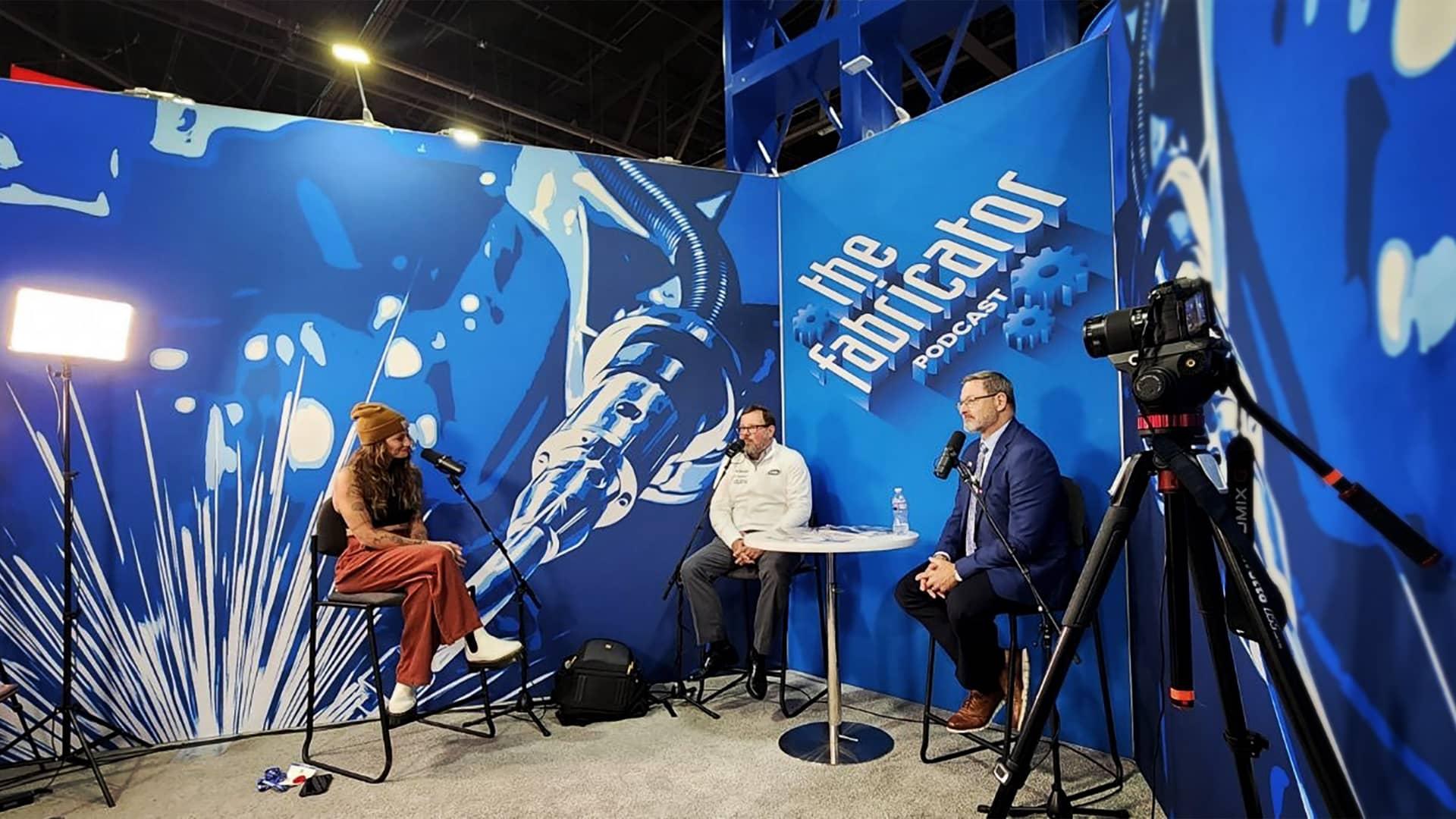
About This Podcast
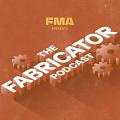
All Episodes
-
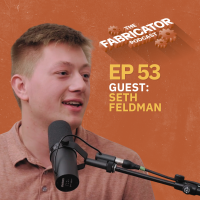 Ep. 053
Ep. 053 -
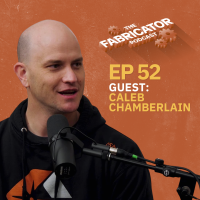 Ep. 052
Ep. 052 -
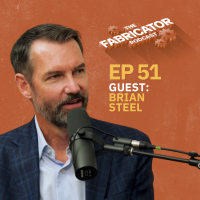 Ep. 051
Ep. 051 -
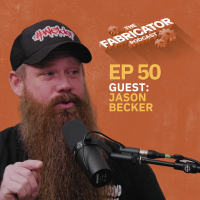 Ep. 050
Ep. 050 -
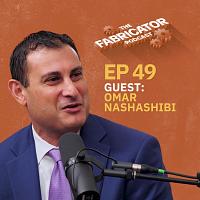 Ep. 049
Ep. 049 -
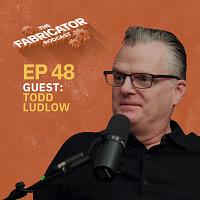 Ep. 048
Ep. 048 -
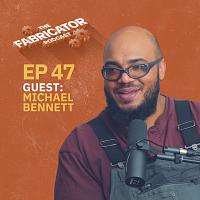 Ep. 047
Ep. 047 -
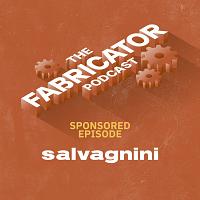 Bonus
Bonus -
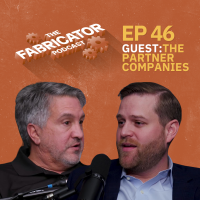 Ep. 046
Ep. 046 -
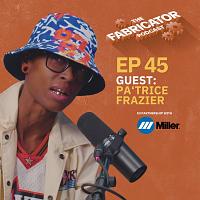 Ep. 045
Ep. 045 -
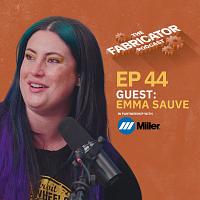 Ep. 044
Ep. 044 -
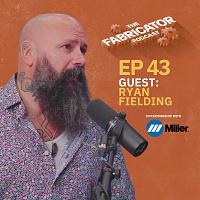 Ep. 043A Rolls-Royce and other SEMA builds with Ryan Fielding of Ringbrothers
Ep. 043A Rolls-Royce and other SEMA builds with Ryan Fielding of Ringbrothers -
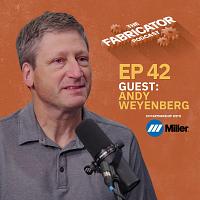 Ep. 042
Ep. 042 -
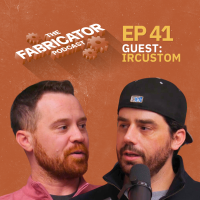 Ep. 041
Ep. 041 -
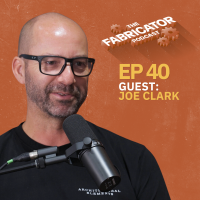 Ep. 040
Ep. 040 -
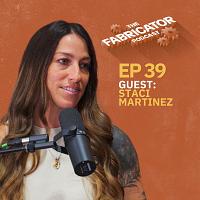 Ep. 039
Ep. 039 -
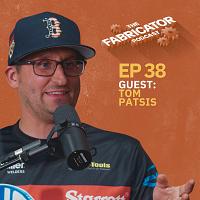 Ep. 038
Ep. 038 -
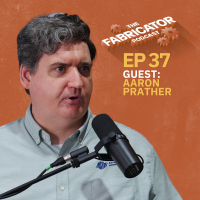 Ep. 037
Ep. 037 -
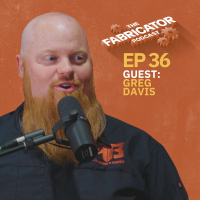 Ep. 036
Ep. 036 -
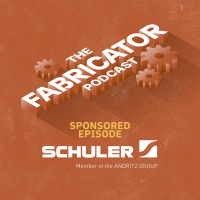 Bonus
Bonus -
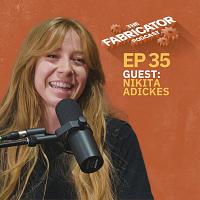 Ep. 035
Ep. 035 -
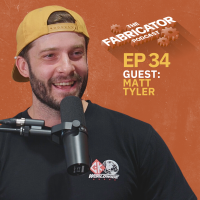 Ep. 034
Ep. 034 -
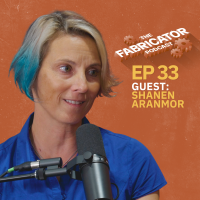 Ep. 033
Ep. 033 -
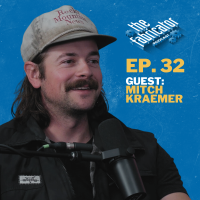 Ep. 032
Ep. 032 -
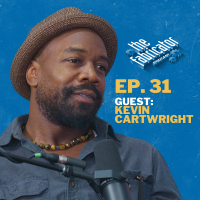 Ep. 031
Ep. 031
























